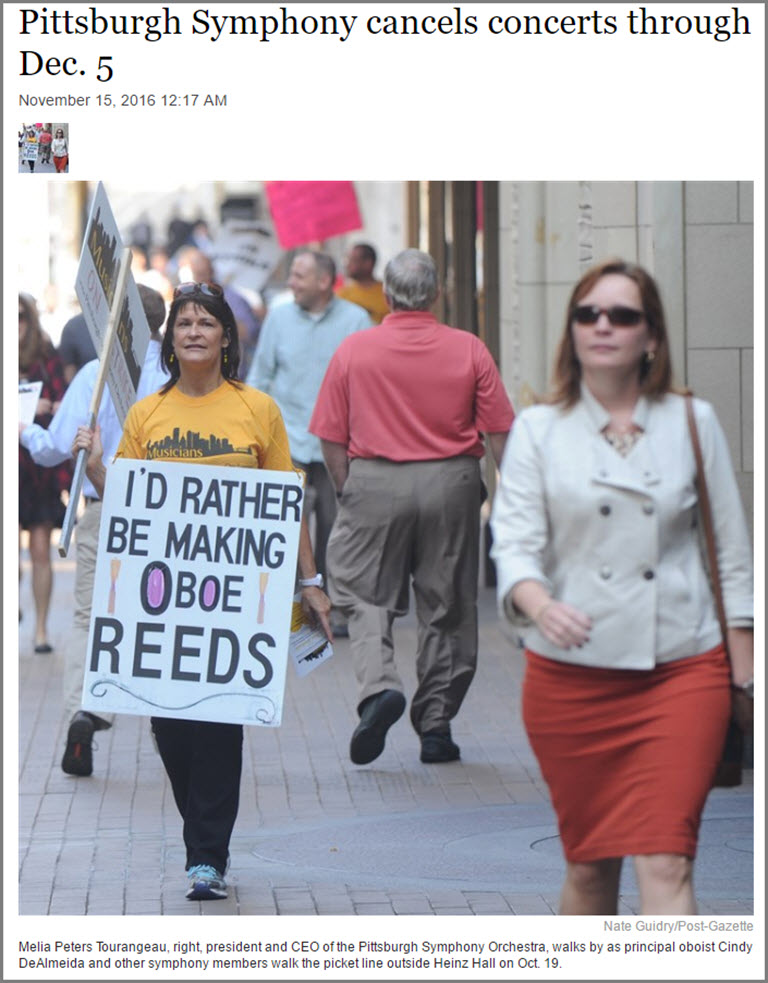The Pittsburgh Symphony Orchestra (PSO) recently announced another round of event cancellations through November 18, 2016. Although cancellations are par for the course during a work stoppage, what makes this round of cancellations unusual is they appear to be driven more by brinkmanship than an inability to reach an agreement.
 Failing to reach an agreement assumes both sides are negotiating but as of now, describing parties as actively bargaining wouldn’t come close to being an accurate statement.
Failing to reach an agreement assumes both sides are negotiating but as of now, describing parties as actively bargaining wouldn’t come close to being an accurate statement.
Let’s begin with an article published in the 10/17/2016 edition of the Pittsburgh Tribune-Review written by Mark Kanny. It’s a straightforward article announcing the latest cancellations along with including statements from musician and PSO representatives. Having said that, both statements contained some unusual references that warrant additional clarity.
In order to discover more I contacted musician and PSO representatives.
No, We Don’t Agree To Disagree.
According to the Tribune-Review article, PSO chief operating officer, Christian Schornich, indicated bargaining had yet to commence because the musicians failed to communicate through official channels (emphasis added).
“Regrettably, the musicians of the Pittsburgh Symphony Orchestra have not contacted us through official channels to return to the negotiating table. We hope that we are able to resume talks soon.”
Within the broader context of collective bargaining, communication protocol isn’t a very common reason for extending a work stoppage and cancelling concert events. So in order to confirm what, precisely, qualifies as an official channel of communication and why this was an impediment to bargaining, I contacted the PSO for clarification.
According to Louise Cavanaugh Sciannameo, PSO Vice President of Public Affairs, the PSO considers “legal counsel, the orchestra committee, or [the] federal mediator” as an acceptable official channel. When asked if the PSO has reached out to musicians in order to schedule bargaining sessions since the onset of the work stoppage, she confirmed they have via the federal mediator.
When asked about the status of bargaining and using the federal mediator as the primary point of contact for communication, Micah Howard, Chair, Pittsburgh Symphony Orchestra Committee, said they too have been telling the federal mediator they wish to continue bargaining.
“Since [the onset of the strike] we have continued to tell the mediators that we would like to return to the table,” said Mr. Howard. “It is our understanding that the mediators communicate that to the [PSO].”
The PSO asserts they have contacted the federal mediator and expressed a clear interest in scheduling bargaining sessions and the musicians purport an identical position. Yet, both sides seem completely unaware of the other other’s position.
It’s safe to assume that the Federal Mediation And Conciliation Service has no interest in keeping both sides from bargaining so ideally, this revelation will help both parties begin bargaining and hopefully avoid imposing potentially unnecessary event cancellations on patrons.
Zero Sum And Hyperbole
The musicians’ press statement in response to the cancellations focused primary on a nonstarter condition for bargaining being imposed by the PSO. Specifically, that the PSO is unwilling to bargain unless the musicians first accept their last, best, and final offer.
“We are ready to negotiate an end to this dispute so the Musicians can be back on stage at Heinz Hall. But Management has repeatedly declared that they are unwilling to compromise – that they won’t even meet with us unless we accept the ‘last, best, and final’ contract demands they made a month ago.
Perhaps unsurprisingly, the need for bargaining under these conditions would be moot.
But according to Mr. Howard, this is a well-known PSO demand and he proceeded to offer additional perspective.
“Management has repeatedly stated publicly and through the mediators that they will not negotiate unless and until we are willing to accept the [last, best, and final offer],” said Mr. Howard. “If that seems to make no sense, well, it doesn’t. That simply is not negotiating.”
When asked for any material to corroborate, Mr. Howard referenced a Pittsburgh CBS affiliate video interview with Melia Tourangeau, PSO president and CEO, where she does assert “…because of our situation, we don’t feel like we’re able to move from last, best, final offer” but does not go so far as to indicate accepting those terms is a prerequisite for bargaining.
Given cagy nature of responses, it was time to pursue unambiguous clarity.
I returned to Ms. Cavanaugh Sciannameo in order to obtain expanded details on this seemingly insurmountable roadblock to restarting negotiations and she said the musicians’ statement was inaccurate. Having said that, she reiterated that the PSO “has said that having a common understanding of the financial crisis that exists is necessary to productive conversation.”
When asked if “a common understanding of the financial crisis” may not rise to the level of full acceptance but if it is the same as requiring a zero sum bargaining condition in order to restart negotiations (a topic we examined on 10/6/2016), Ms. Cavanaugh Sciannameo neither confirmed nor refuted that correlation. Instead, she referenced the PSO’s online talking points and reiterated “management is prepared to return to the table at any time.”
The PSO labor dispute isn’t even one month old and we’ve already reached a point where deliberate overstatement and persistent evasiveness are the cornerstones for crafting public relations positions. It’s as though the season killing Minnesota Orchestra labor dispute is an ancient tome written in a dead language. Nothing to learn here folks. Move along.
For now, all of this indicates little potential for a settlement coming any time soon and it should come as no surprise if more cancellations for longer stretches of time are in the works.



Please note that this “last, best, and final offer” was the Detroit Symphony management position leading to our six-month strike in the season just before that of the Minnesota Orchestra. I am sure it appears in most management “guides to tough negotiation,” but it does indeed stymie communication and prevents any possible negotiation. In our case, we had a “last, best offer” that, when turned down, became a much worse “last, best and final offer.”
It was certainly a shock to many of us to be treated in this callous way. We were no longer respected professionals but had become “Labor”, to be beaten into submission.
Someone on the Pittsburgh Board has to be persuaded that another course should be taken.
I send my colleagues in Pittsburgh sympathy and best wishes for a speedy solution.
Cathy Compton, DSO violist, retired
Cathy, I fully support the musicians’ side in this dispute, but if you care at all about the support of other unions, I’d advise against using “labor” as a pejorative.
I certainly do not see labor in a negative way, but I used as I did it to try to explain the behavior of some board members who seem to have very negative feelings about unions. When it is contract time they morph from supportive patrons into business owners cutting costs any way they can.